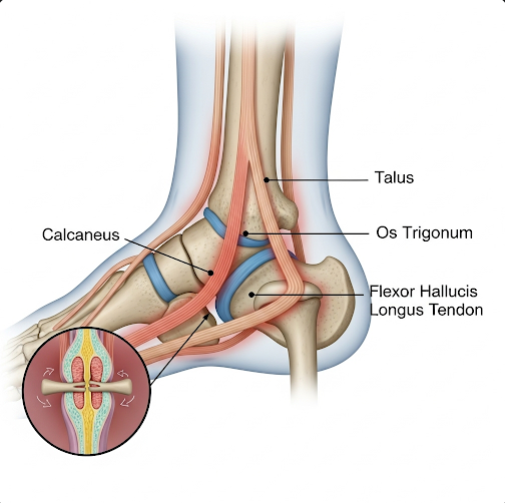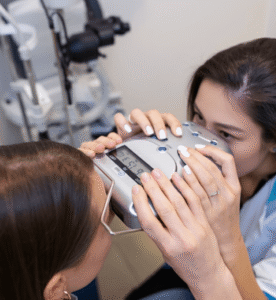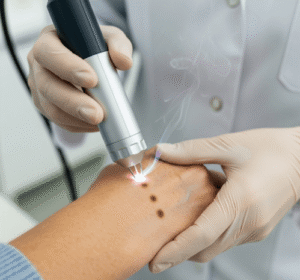Overview
Os Trigonum Syndrome is a painful foot condition caused by irritation or injury to a small, extra bone (the os trigonum) located at the back of the ankle joint. This accessory bone is present in some people from birth and usually does not cause problems, but in certain cases—especially after injury or repetitive ankle movement—it can lead to inflammation and pain. In Korea, this condition is well-recognized in sports medicine and orthopedic clinics, where advanced imaging and minimally invasive treatments are available to help patients recover quickly and return to their activities.
What is Os Trigonum Syndrome?
Os Trigonum Syndrome occurs when the small accessory bone behind the ankle becomes compressed or irritated, often during downward pointing of the toes (plantar flexion). It is commonly seen in athletes, dancers, and soccer players who repeatedly stress the ankle joint. The condition can result from acute injury or from chronic overuse, leading to persistent discomfort, swelling, and reduced ankle movement.
Symptoms
Common symptoms of Os Trigonum Syndrome include:
- Pain at the back of the ankle, especially when pointing the toes downward
- Swelling or tenderness behind the ankle joint
- Stiffness or reduced range of motion in the ankle
- Pain that worsens with physical activity and improves with rest
- In some cases, a popping or clicking sensation during movement
Causes
The main causes of Os Trigonum Syndrome are:
- Presence of an accessory os trigonum bone (a congenital variation)
- Repetitive ankle movements, especially plantar flexion
- Acute ankle injury, such as severe sprain or trauma
- Inflammation of surrounding soft tissues, tendons, and joint capsule
- Sports or activities involving frequent pointing of the toes, like ballet or soccer
Risk Factors
Factors that may increase the likelihood of developing Os Trigonum Syndrome include:
- Being a dancer, soccer player, or athlete in sports involving repetitive ankle extension
- Previous ankle injuries or chronic ankle instability
- Anatomical variations such as a larger os trigonum bone
- Poorly fitted footwear or inadequate ankle support during activity
Complications
If left untreated, Os Trigonum Syndrome can lead to:
- Chronic ankle pain
- Reduced athletic performance
- Persistent swelling and stiffness
- Increased risk of ankle instability or further injury
- Difficulty in activities requiring strong ankle motion, such as running or jumping
Prevention
While Os Trigonum Syndrome cannot be prevented in people born with the accessory bone, steps can be taken to lower the risk of symptoms:
- Proper warm-up and stretching before physical activity
- Using well-fitting shoes with good ankle support
- Avoiding overuse and allowing rest between intense training sessions
- Strengthening and conditioning exercises for ankle stability
- Prompt treatment of ankle injuries to avoid long-term complications
Treatment Options in Korea
In Korea, Os Trigonum Syndrome is treated with a range of conservative and surgical approaches:
- Rest and activity modification to reduce stress on the ankle
- Medications such as anti-inflammatory drugs to relieve pain and swelling
- Physical therapy focusing on stretching, strengthening, and mobility
- Corticosteroid injections to reduce inflammation in severe cases
- Surgical removal of the os trigonum bone if conservative measures fail
Specialized orthopedic and sports medicine centers in Korea use advanced diagnostic imaging such as MRI and ultrasound to confirm the condition and design a personalized treatment plan. With early diagnosis and proper care, most patients can return to normal activities within weeks to months.













